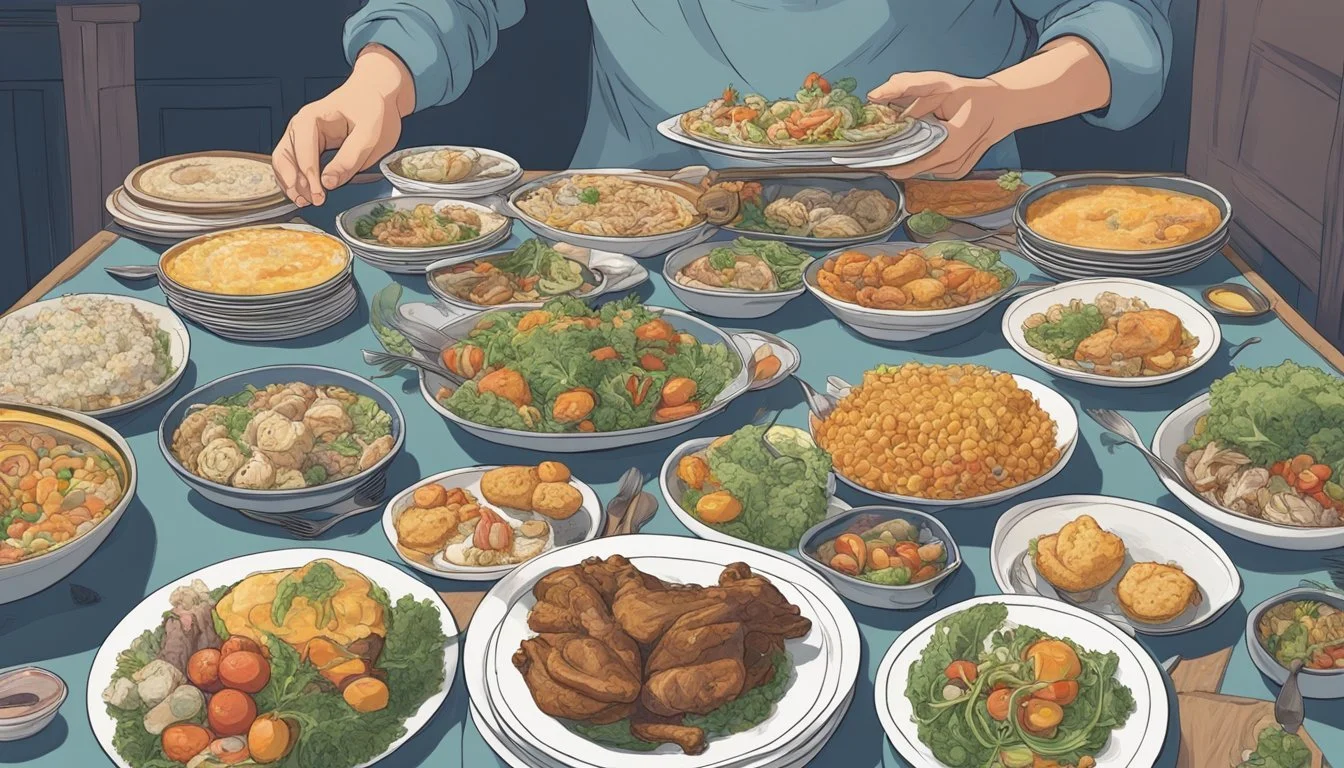9 Reasons Why Narcissists Often Pursue Extreme Diets or Eating Habits
Unveiling Motivations
Narcissists often exhibit distinct and sometimes perplexing eating behaviors, drawing attention from both professionals and laypeople alike. These behaviors can range from extreme diets to unusual eating habits, posing a question about the underlying psychological motivations.
Understanding why narcissists often pursue such extreme diets or eating habits provides valuable insights into their complex personalities. By examining these motivations, one can better comprehend the interplay between narcissism and food, shedding light on the broader implications for their daily lives and relationships. This article explores these reasons, offering clarity on a frequently misunderstood aspect of narcissistic behavior.
1) Desire for Control
Narcissists often exhibit a strong desire to control various aspects of their lives. This control extends to their eating habits and diets. By managing what they eat, they can maintain a sense of dominance over their environment and their bodies.
Control over food intake can manifest in several ways. Some narcissists might adopt strict dietary regimens to dictate what they consume. Others might be very particular about meal times, food preparation, and portion sizes.
Self-image plays a crucial role in their desire for control. By tightly regulating their diet, narcissists aim to achieve and maintain a specific body image. This need for control is often aligned with their need to project a certain persona to the outside world.
Additionally, the desire for control can sometimes lead narcissists to impose their eating habits on others. This behavior reinforces their dominance within relationships. They may insist that family members or partners adhere to their dietary preferences and rules, reflecting their controlling nature.
A shocking look at narcissist weird eating habits further supports the idea that these habits are driven by deep psychological needs for control and self-image maintenance.
2) Attention-Seeking Behavior
Narcissists often exhibit attention-seeking behaviors through their eating habits. These individuals might use food as a tool to draw the spotlight on themselves. For example, they may refuse to eat common dishes at social events to prompt questions and gain attention.
They may also flaunt their strict dietary choices, like veganism or gluten-free diets, highlighting their perceived superiority or uniqueness. This behavior often reflects their desire to stand out and be the center of attention in social gatherings.
Some narcissists may exaggerate food allergies or intolerances. This tactic not only garners attention but also obliges others to accommodate their needs, reinforcing a sense of importance. These eating habits can serve as a constant means of ensuring they remain the focus of conversations.
In extreme cases, narcissists might exhibit dramatic reactions to foods they don’t prefer. This could involve making a scene about a meal not meeting their standards, further ensuring all eyes are on them. Their need for admiration and validation plays a significant role in these behaviors.
For more information on attention-seeking behavior and its traits, you can visit Verywell Mind’s article on attention-seeking behavior.
3) Impression Management
Narcissists often engage in extreme diets or unusual eating habits as a way to control how they are perceived by others. By following specific dietary regimens, they can project an image of discipline, superiority, or exclusivity.
This behavior aligns with the concept of impression management, where individuals attempt to influence how others view their abilities, attitudes, and characteristics. Narcissists excel at self-presentation and may use their diet choices to reinforce their desired image.
For example, adopting a rare or highly restrictive diet can set a narcissist apart from others, showcasing their uniqueness. They may also use their eating habits to emphasize their commitment to health and wellness, portraying themselves as more dedicated or enlightened.
This strategy helps them garner admiration or attention from others, reinforcing their need for validation and affirmation. Narcissists might also selectively share their eating habits on social media or in conversation to highlight their commitment and self-discipline.
Overall, the focus on impression management underscores the narcissist's drive to control their public image through various means, including their dietary choices. This behavior demonstrates their consistent effort to maintain and enhance their perceived status and self-worth.
4) Validation Through Appearance
Narcissists often seek to validate their self-worth through their physical appearance. Their need for admiration drives them to pursue diets that promise quick and dramatic results. For them, looking good is a way to command attention and approval from others.
Extreme diets serve as a tool to achieve the ideal look they believe will earn them validation. These dietary changes are not always rooted in health but in the desire to project a certain image.
For example, a narcissist may engage in overindulgence or extreme restriction relative to food. The end goal is often about maintaining control and showcasing discipline to those around them.
Pursuing an extreme diet can also be a way to stand out. By adhering to specific and often restrictive eating habits, narcissists aim to appear superior and more attractive than others.
5) Fear of Aging
Narcissists often adopt extreme diets or eating habits due to a significant fear of aging. This fear stems from their obsession with maintaining a youthful appearance and staying attractive to others.
As they age, narcissists may notice signs of deterioration in their physical appearance. This leads them to seek drastic measures to preserve their looks.
They might become hyper-focused on diets that promise anti-aging benefits, such as those rich in antioxidants or low in calories. The goal is to stave off visible signs of aging as long as possible.
This pursuit is often driven by the need to receive validation and admiration from others. They associate youth with desirability and fear losing their appeal as they age.
Narcissists may also engage in extreme exercise routines to complement their dietary habits. These routines are part of their broader strategy to fight the aging process and maintain a body image that receives social approval.
The relentless focus on anti-aging diets can cause narcissists to neglect balanced nutrition. In their quest to maintain youthfulness, they might risk their health by following unsustainable or unhealthy eating practices.
For the narcissist, the fear of aging is a primary motivator behind their extreme dietary choices. This fear persists as a constant pressure, influencing their decisions around food and lifestyle.
6) Perfectionism
Narcissists are often driven by an intense need for perfection. This trait can extend to various aspects of their lives, including their eating habits.
Perfectionism may lead narcissists to adhere strictly to specific diets or eating patterns. These individuals might continually seek the "perfect" diet to maintain an idealized body image.
Perfectionism in narcissists can also trigger disordered eating. They may develop rigid dietary rules and become highly critical of any deviations from these rules.
In extreme cases, the pursuit of perfection can cause narcissists to engage in harmful behaviors. This includes excessive calorie restriction or over-exercising to compensate for perceived dietary failures.
The link between perfectionism and eating disorders is well-documented. Research indicates that personality traits like perfectionism contribute to body dissatisfaction and disordered eating.
Narcissists with perfectionist tendencies may experience heightened anxiety and stress related to food and body image. This can result in a cycle of strict dieting and unhealthy eating behaviors.
For further reading on how perfectionism is related to disordered eating, you can visit Psychology Today.
7) Compensation for Insecurity
Narcissists often use extreme diets or eating habits to compensate for deep-seated insecurity. They may harbor feelings of inadequacy and strive to project an image of control and perfection through their dietary choices.
These eating habits can serve as a way to bolster their self-esteem. By adhering to strict dietary regimes, they feel a sense of accomplishment and superiority.
The need to mask their insecurity might also manifest through grandiose displays of dietary discipline. They seek validation from others by showcasing their commitment to particular eating habits.
Their relationship with food can thus become a tool for maintaining a façade of confidence. The insecurity behind these actions is a significant driving force, pushing them to pursue diets that they believe will earn them admiration.
Obsessive focus on dietary practices can be a coping mechanism. By controlling their food intake meticulously, they attempt to control and compensate for feelings of instability and inadequacy.
8) Competitive Nature
Narcissists often approach life with a competitive mindset. They view interactions and relationships as zero-sum games, where they must win or come out on top. This competitive streak extends to their eating habits and dietary choices.
A narcissist’s need to appear superior can manifest through extreme diets. They may adopt strict dietary plans to showcase their discipline. Through this, they aim to earn admiration and respect from others.
Being highly competitive, they might compare their eating habits with those around them. If someone else is following a diet, a narcissist may feel compelled to go even further. This need to outdo others can lead to increasingly rigid or bizarre dietary behaviors.
Extreme self-centeredness is often a hallmark of narcissistic personality traits. For instance, they might insist on others accommodating their dietary needs. This stems from a deeper desire to assert dominance and control in social settings.
Such behaviors might also be a way for narcissists to feel superior about their health-consciousness. They might make a show of their eating habits, turning meals into performances of dietary discipline. This behavior can sometimes make interactions with them challenging and confusing.
This competitive nature not only affects their personal relationships but also influences their everyday actions, including something as fundamental as eating habits.
9) Need for Admiration
Narcissists often crave admiration and attention from others. Their dietary choices can be a reflection of this need. When they indulge in extreme diets or unique eating habits, it draws attention and curiosity from those around them.
By adhering to strict or unconventional diets, narcissists can create a sense of exclusivity. People may view them as disciplined or superior, feeding their desire for admiration. This effort to stand out through their food choices is a tactic to gain validation and praise.
Public displays of their eating habits, such as sharing meals on social media or discussing their strict dietary regimes, can also serve as a way to garner compliments and attention. Whether it’s through extreme dieting or peculiar eating rituals, the need for admiration remains a driving force behind their behaviors.
Understanding the connection between admiration and their eating habits can provide insight into the behaviors of narcissists. They often manipulate food to maintain control or to be perceived in a certain way by others. This behavior is intricately linked to their desire for admiration and validation from the people around them.
For more detailed information, you can read about why the narcissist needs excessive admiration.
Psychological Motivations Behind Extreme Diets
People with narcissistic tendencies often pursue extreme diets or eating habits due to their obsession with appearance and the need to control social perceptions. These motivations drive their behavior and significantly impact their dietary choices.
Narcissistic Traits and Obsession with Appearance
Narcissists tend to prioritize their appearance and often believe that looking good is fundamental to gaining approval and admiration from others. Their deep-seated desire for validation leads them to adopt extreme diets or eating habits to enhance their physical looks. These behaviors are rooted in the belief that their worth is primarily determined by their external appearance.
Examples of extreme diets that narcissists might pursue include restrictive calorie intake, intermittent fasting, or fad diets that promise rapid weight loss. The goal is to achieve a physique that elicits praise and admiration. This obsession with appearance can sometimes lead to unhealthy relationships with food, contributing to disorders such as anorexia or bulimia.
Their fixation on outward looks can also push them to spend excessive time and effort on maintaining their diet and fitness regimen. They often view any deviation from their strict diet as a failure, which can perpetuate negative self-perception and further reinforce their extreme eating habits.
Control and Social Perception
For many narcissists, controlling their diet is a way to exert control over their lives and how they are perceived by others. This control extends to their social circles, where their eating habits can become a tool for displaying discipline and superiority. By showcasing their stringent dietary practices, they seek to impress others and affirm their self-imposed higher status.
Additionally, control over diet can provide a sense of order and predictability in their lives. Manipulating food intake acts as a coping mechanism to manage underlying insecurities and anxieties. This desire for control might manifest in meticulous meal planning, strict adherence to dietary rules, or complete avoidance of certain foods.
Their approach to food often involves using it as a means to project an image of health, sophistication, or self-discipline. This projection feeds into their need for social validation and reinforces their self-worth. Thus, extreme diets become intertwined with their identity and public persona, making it challenging to maintain a balanced and healthy relationship with food.
These psychological motivations underscore the complexities behind why narcissists are drawn to extreme dietary practices. They highlight the significant influence of narcissistic traits on their eating behaviors and the broader implications for their mental and physical health.
Impact of Narcissism on Eating Habits
Narcissism significantly influences eating behaviors, often resulting in restrictive or indulgent patterns and the development of certain eating disorders.
Patterns of Restriction and Overindulgence
Narcissists frequently exhibit erratic eating patterns. They may alternate between extreme restriction and excessive consumption. Their grandiose self-perception often leads them to believe their dietary choices are superior, causing them to impose strict food rules on themselves.
Moreover, they may overindulge as a form of self-medication. Consuming large amounts of food, alcohol, and caffeine becomes a way to cope with stress or negative emotions. This behavior can lead to disrupted sleep patterns, contributing to insomnia and other health issues. The cycle of restriction and overindulgence often reflects their need for control and validation through dietary choices.
Eating Disorders Common in Narcissists
Narcissists are prone to developing specific eating disorders due to their distinct psychological traits. Anorexia nervosa may occur, driven by their desire for perfection and control over their bodies. Additionally, bulimia nervosa can be a manifestation of their fluctuating self-esteem and need for constant approval.
Binge eating disorder is also common, as they may use food as an emotional escape. Their lack of empathy extends to self-care behaviors, resulting in erratic eating that mirrors their internal conflicts. These disorders are often exacerbated by their tendency to manipulate relationships through food, leveraging dietary habits to exert power over others.
Long-Term Effects of Extreme Diets
Extreme diets can have significant impacts on both physical and mental health. These effects often arise from unbalanced nutritional intake and the stress associated with maintaining such diets.
Physical Health Consequences
Extreme diets, such as those very low in carbohydrates or fats, often lead to unbalanced nutrition. This can cause nutrient deficiencies, affecting organs and bodily functions. For instance, low carbohydrate diets can deplete glycogen stores in muscles, leading to fatigue and decreased physical performance.
Moreover, consistently low caloric intake can harm metabolism, causing it to slow down. This makes it harder to maintain weight loss and can lead to weight gain once the diet is stopped. Chronic dieting can also weaken the immune system, making the body more susceptible to illnesses. Over time, severe diets may contribute to the development of eating disorders, affecting overall physical health.
Mental Health Implications
The psychological toll of extreme diets can be profound. The constant need to adhere to strict dietary rules can create feelings of anxiety and stress. This often leads to unhealthy relationships with food, where eating becomes associated with guilt and shame.
Mental health issues such as depression and anxiety can be exacerbated by the restrictive nature of these diets. A lack of essential nutrients, particularly those important for brain health like omega-3 fatty acids, can negatively impact mood and cognitive function. Additionally, the frustration of yo-yo dieting, where weight loss is followed by rapid weight gain, can harm self-esteem and body image. This cycle can be particularly damaging for individuals with tendencies towards obsessive behavior or perfectionism.










